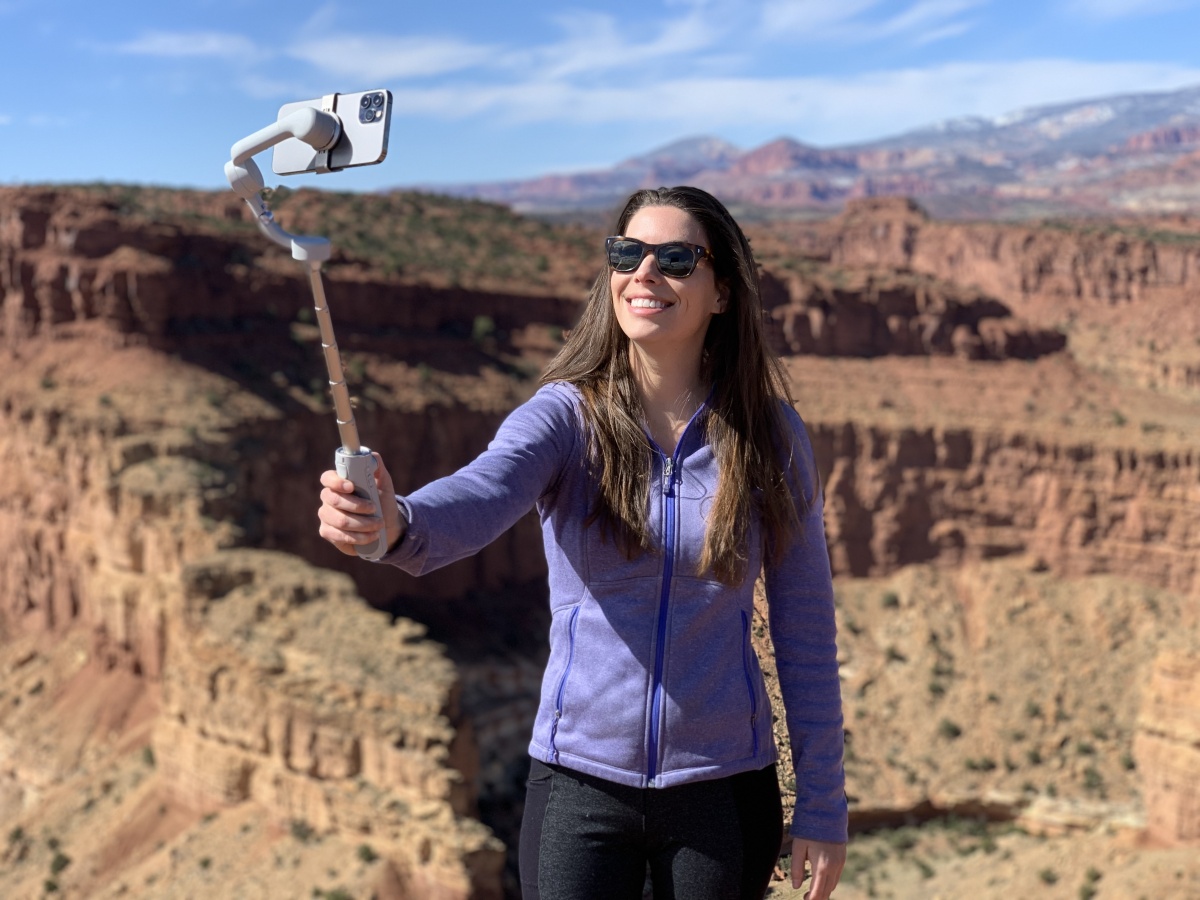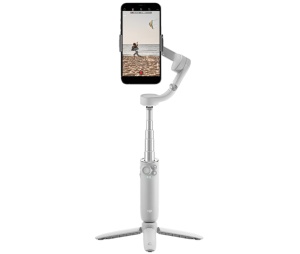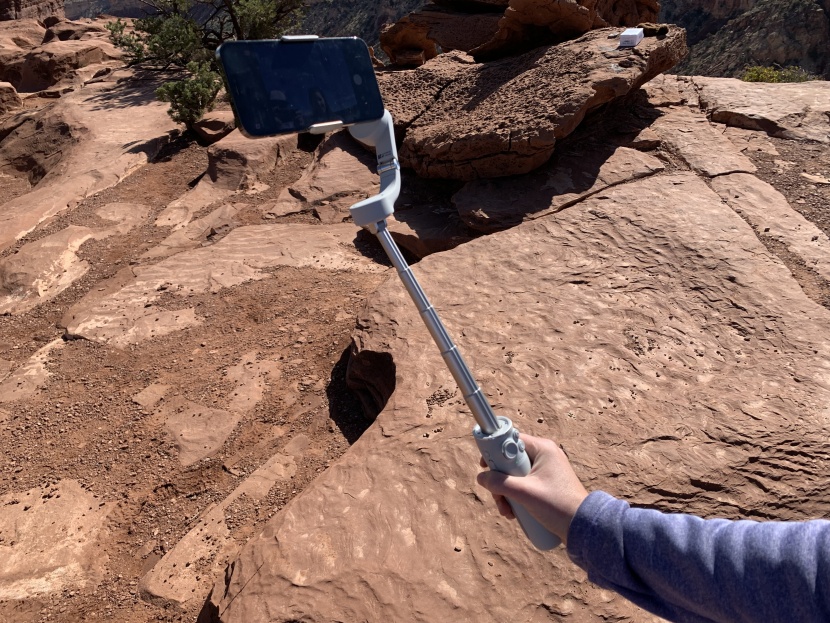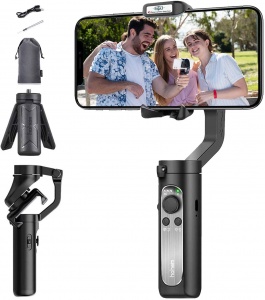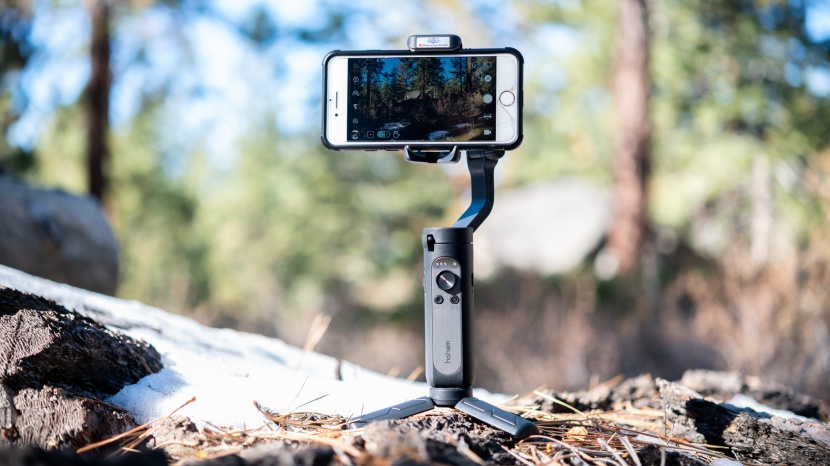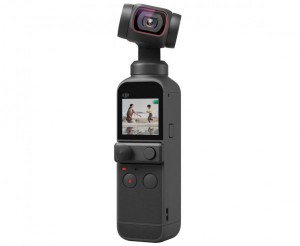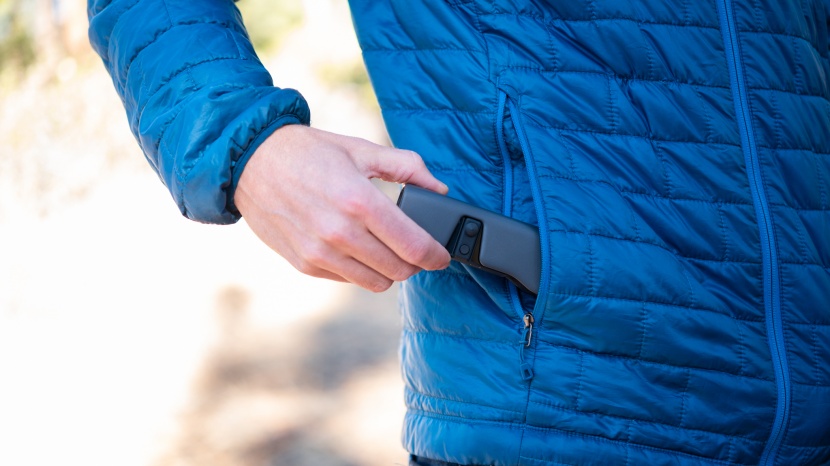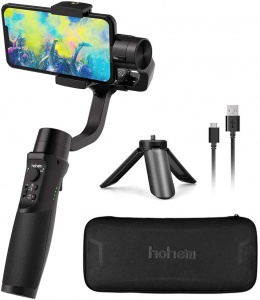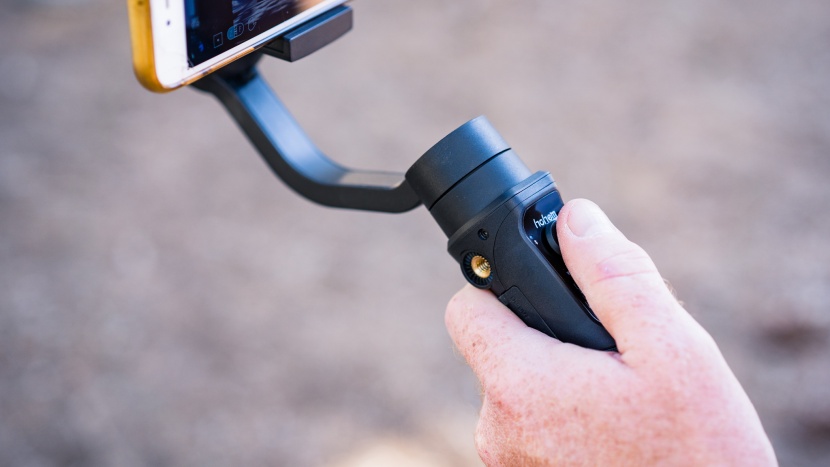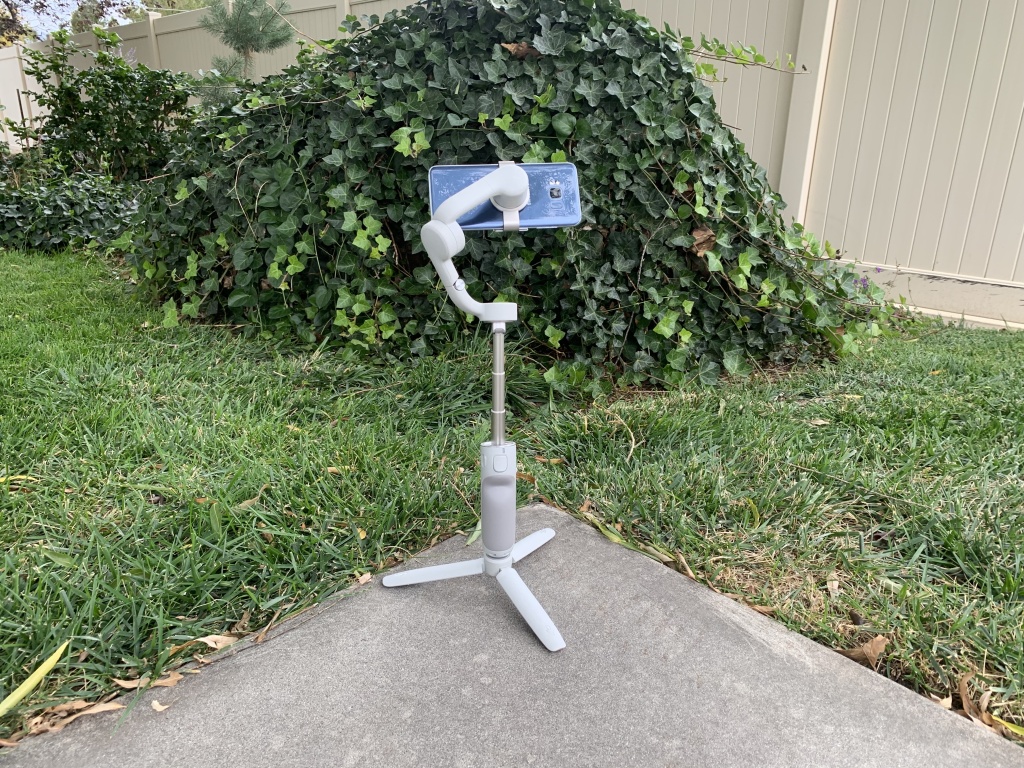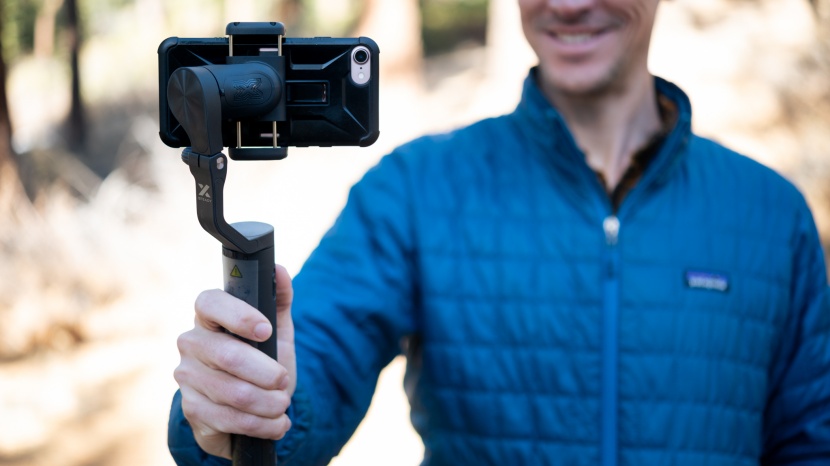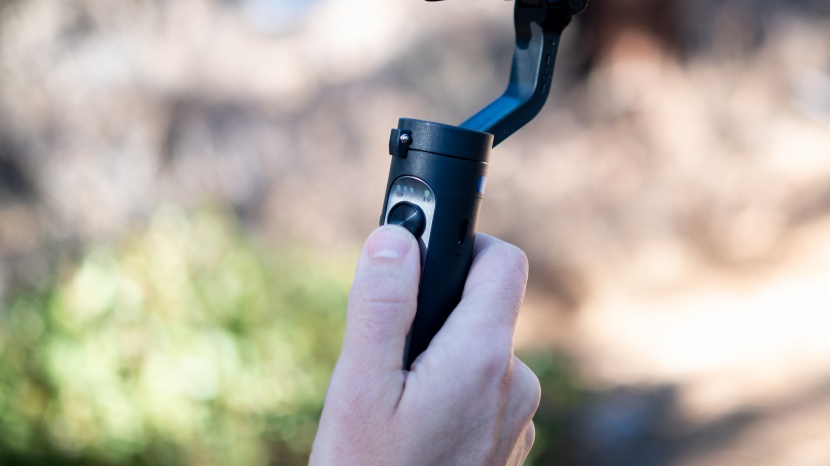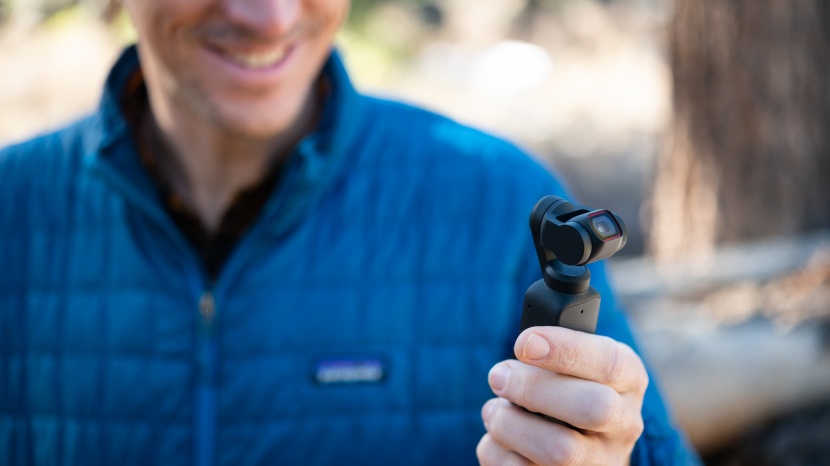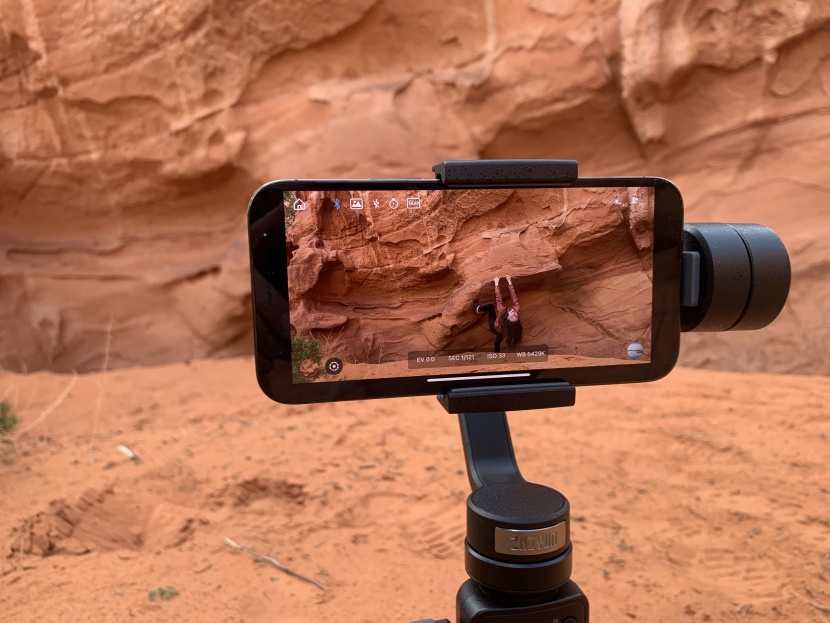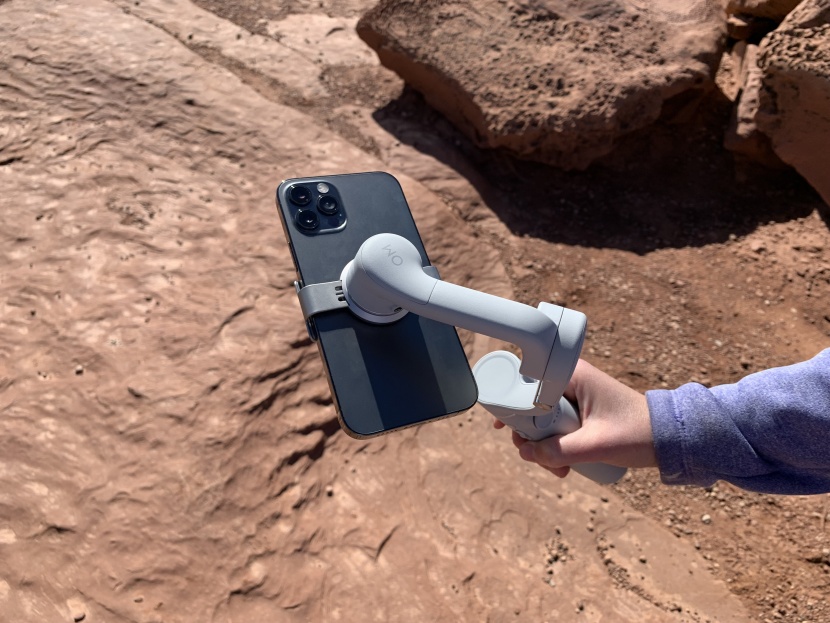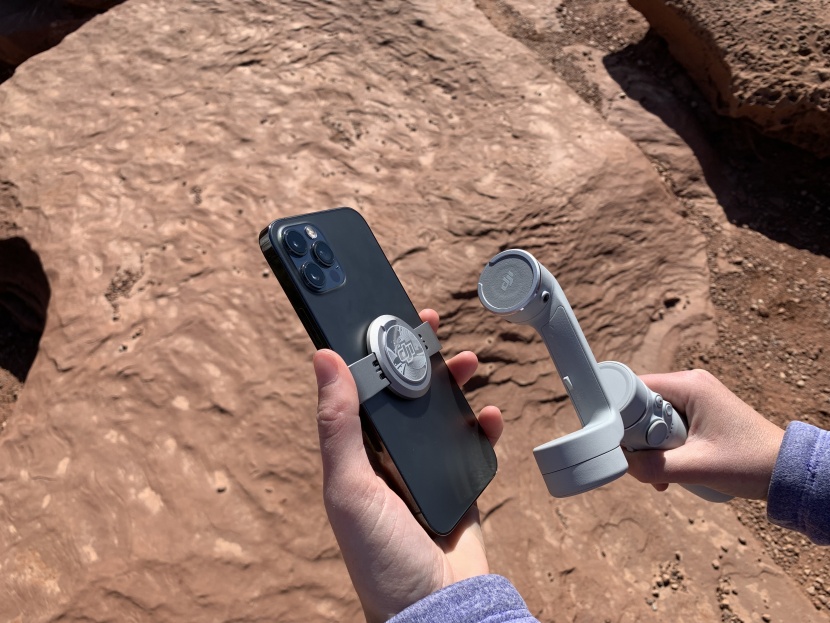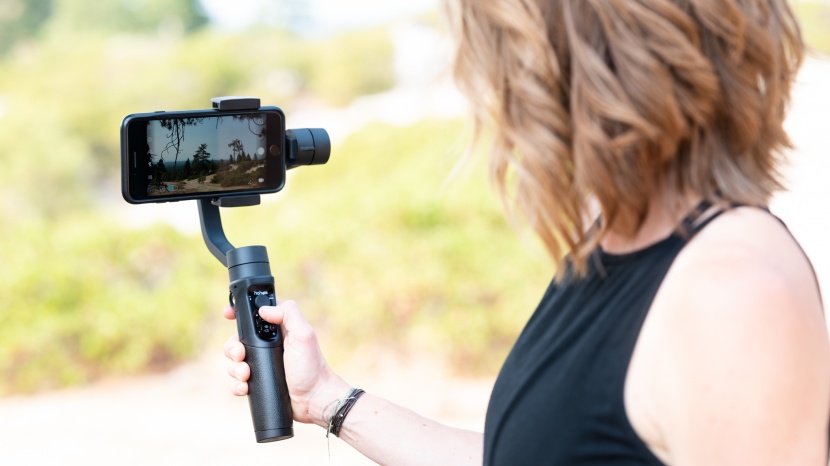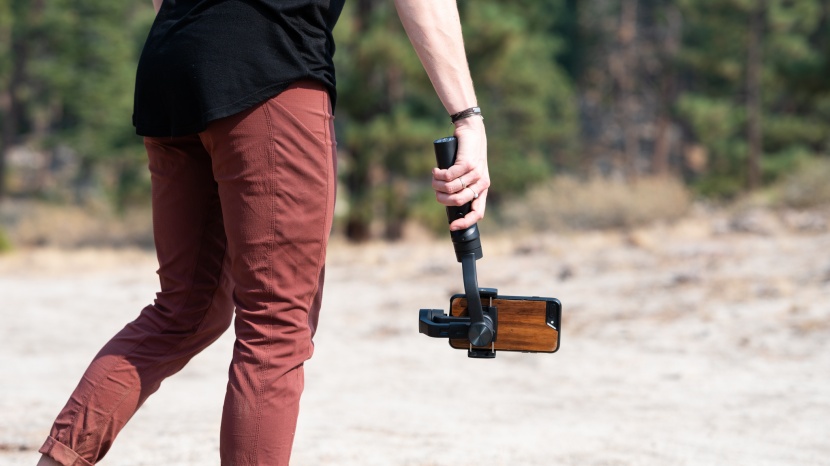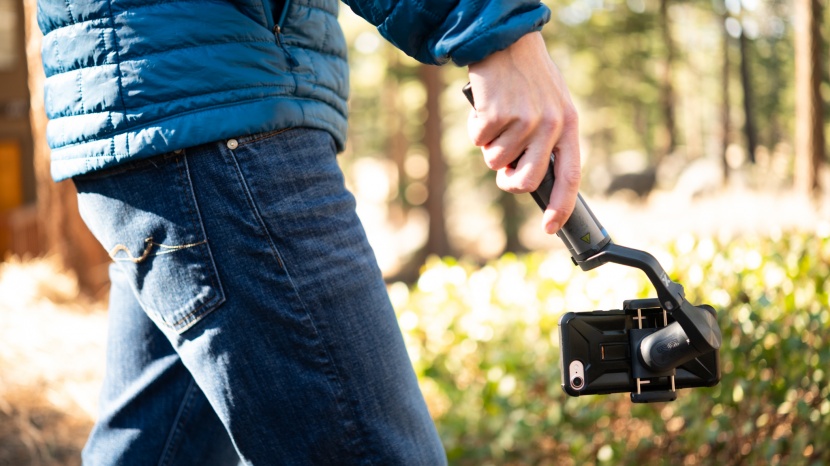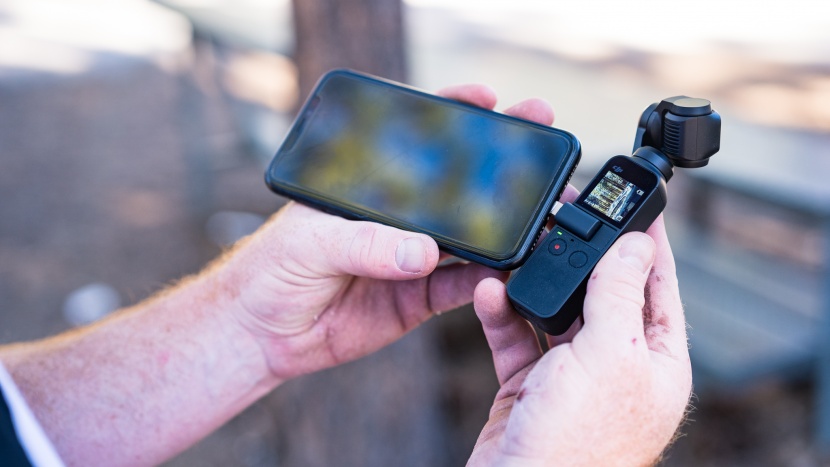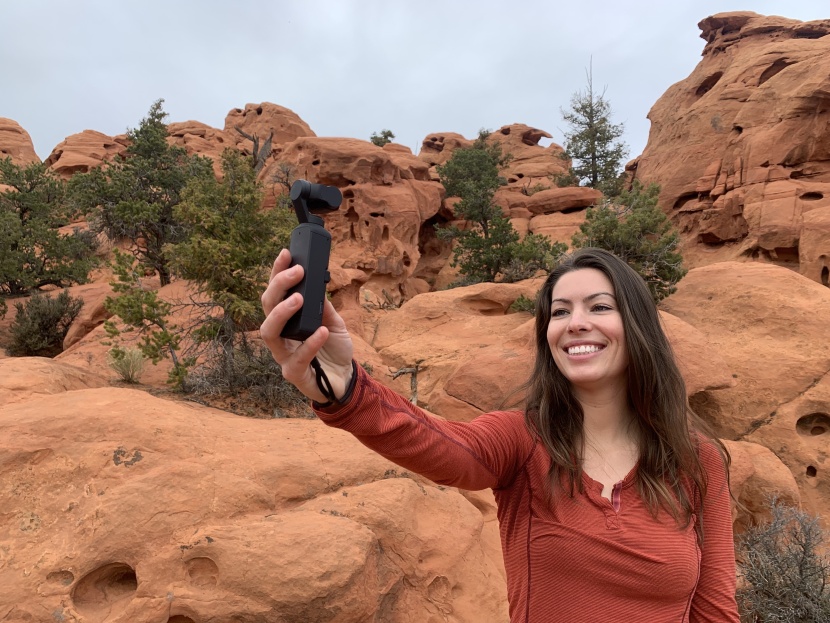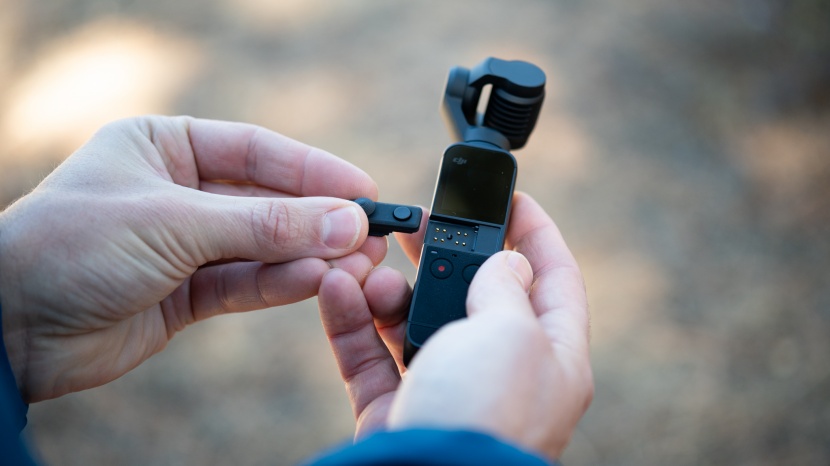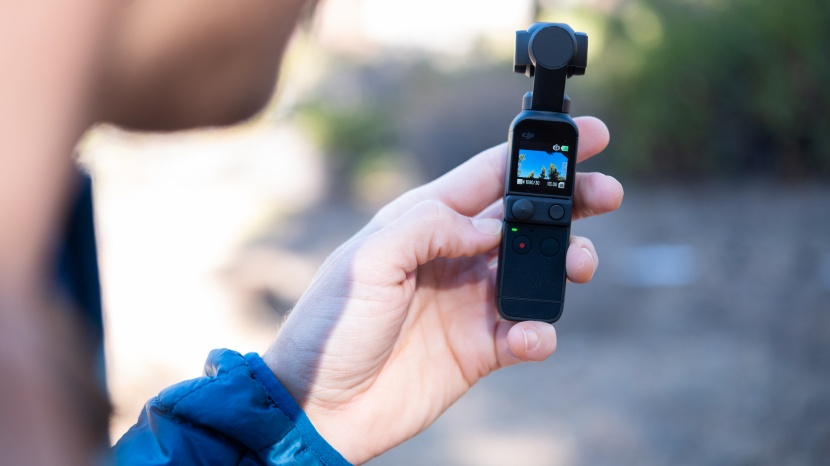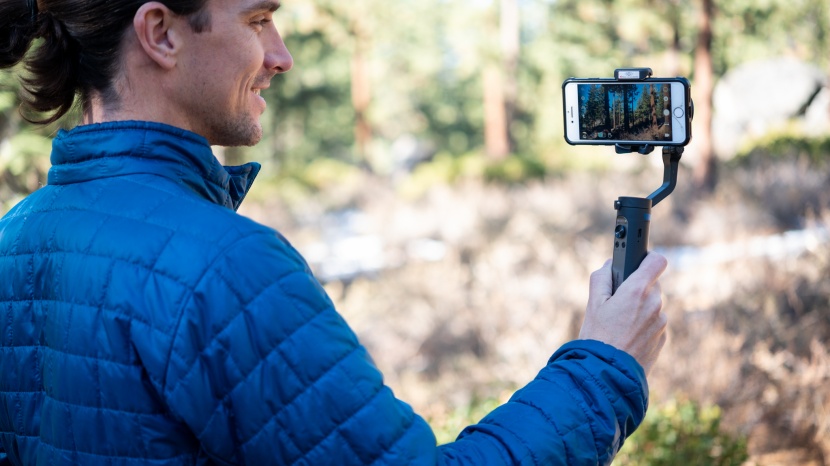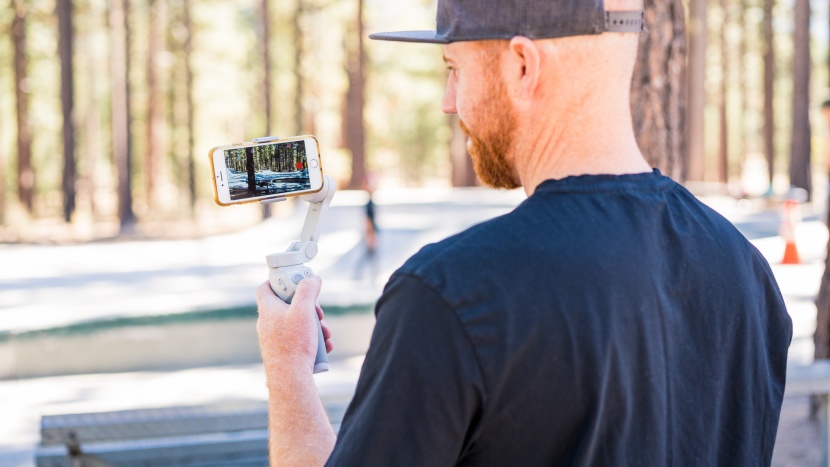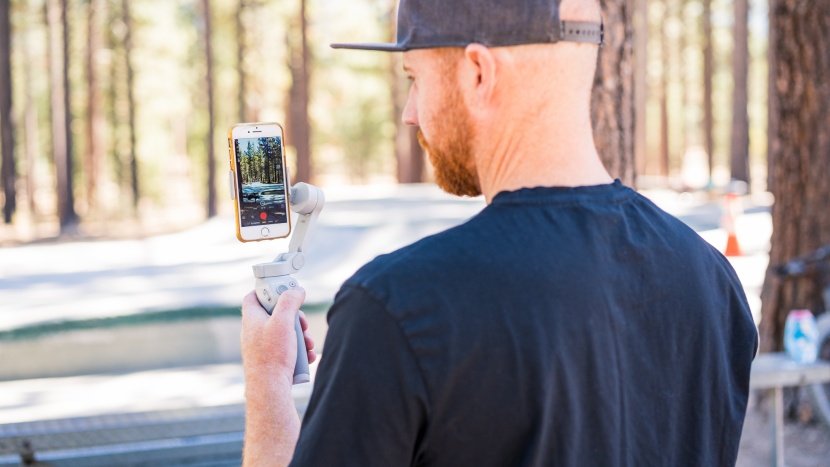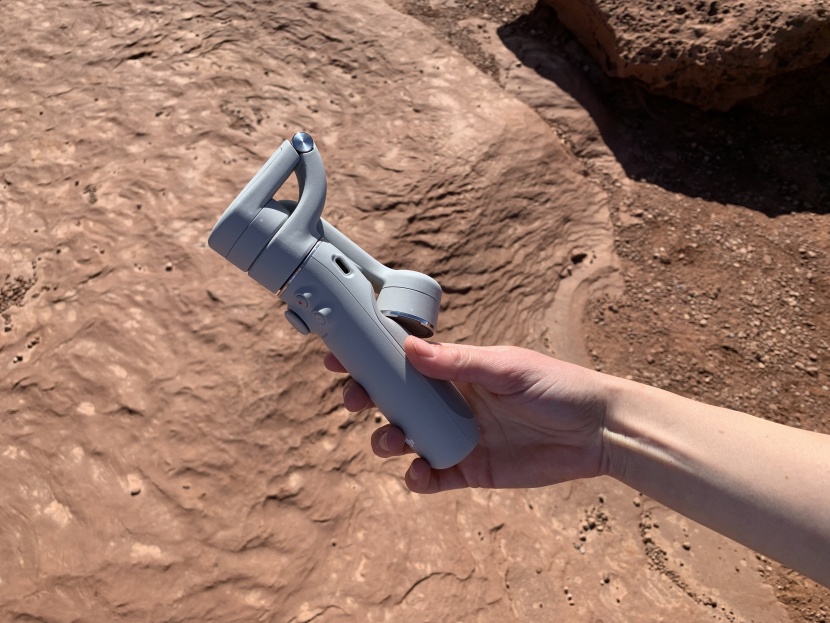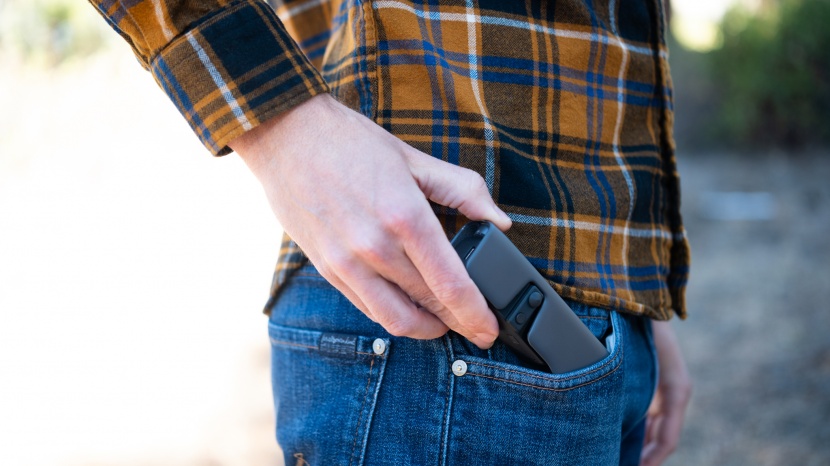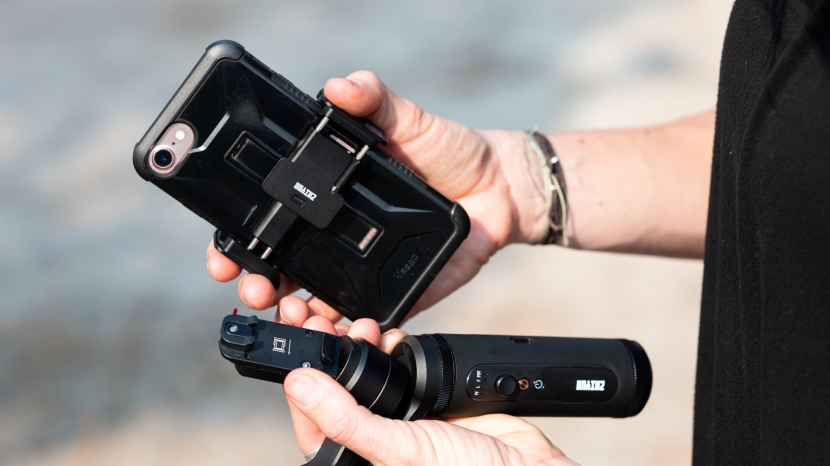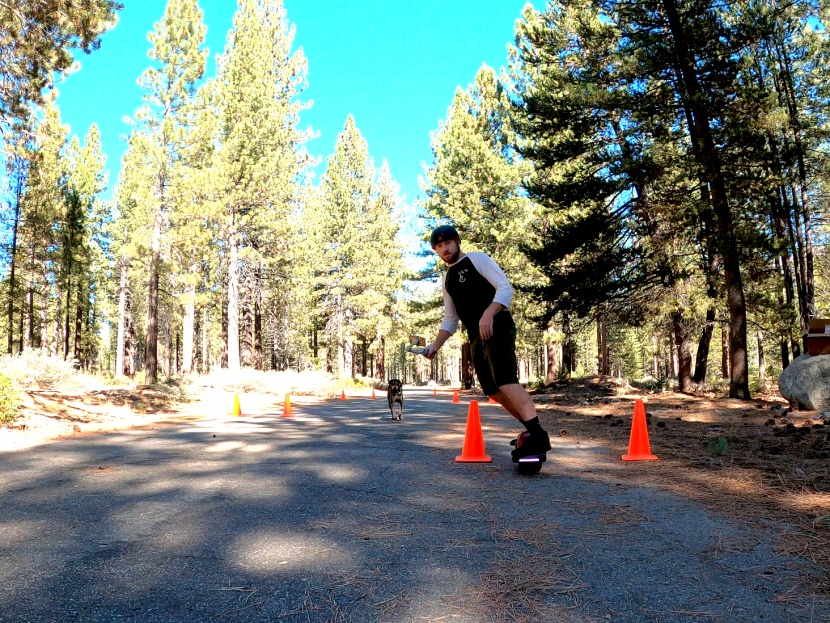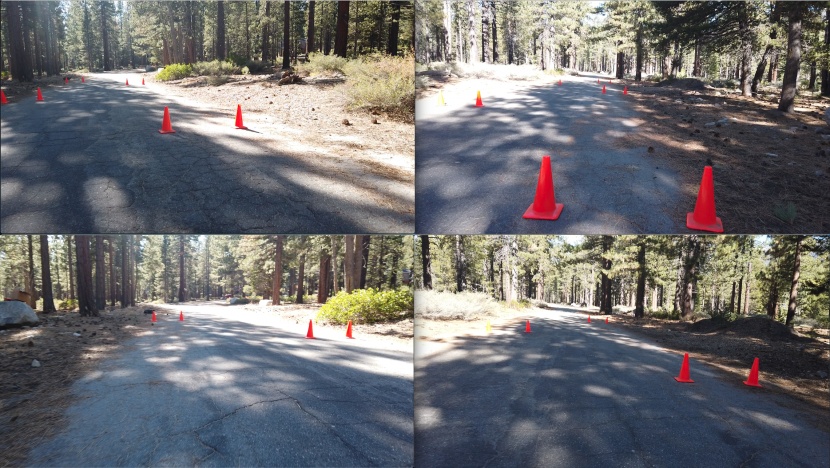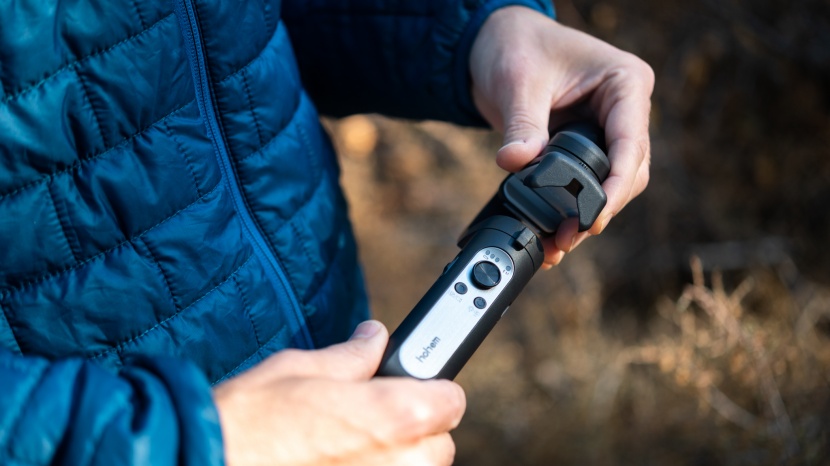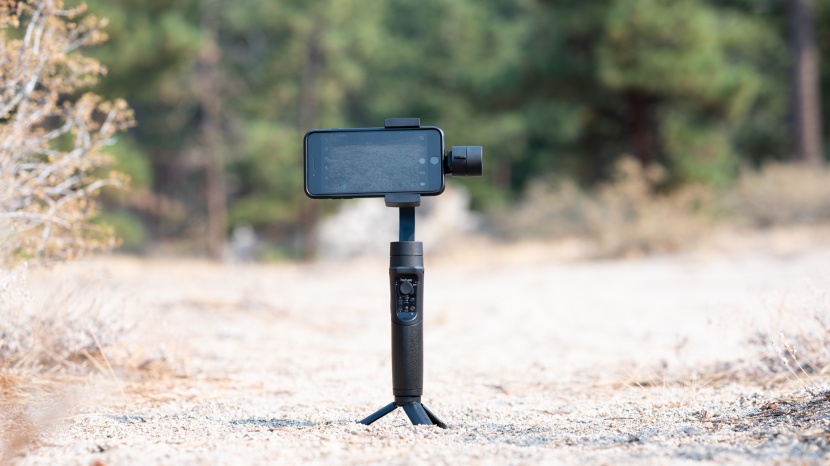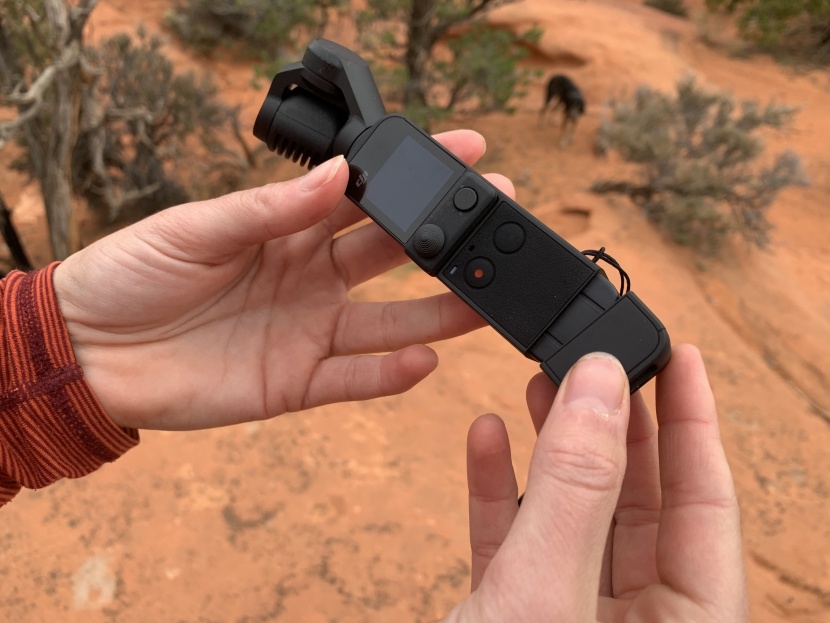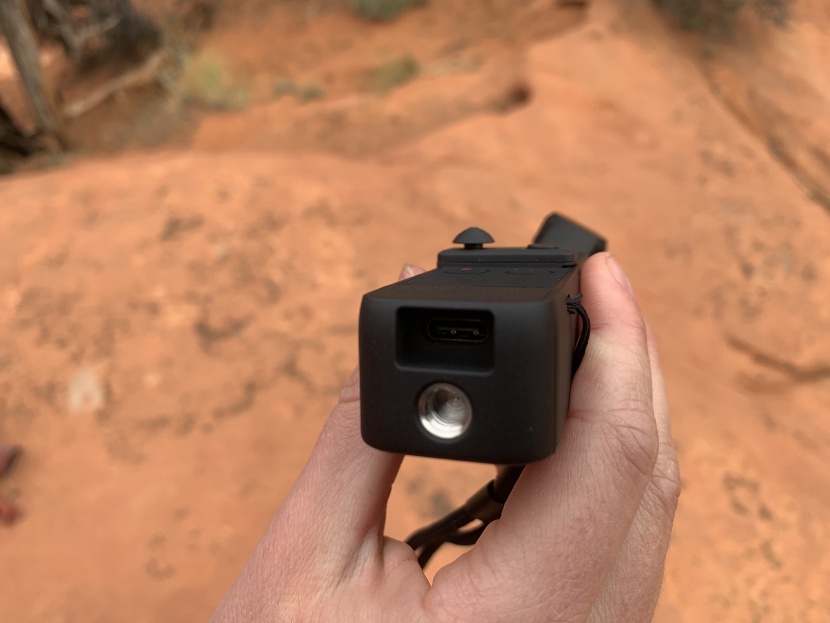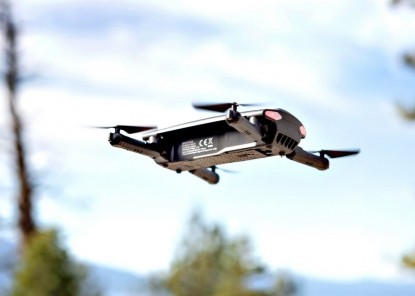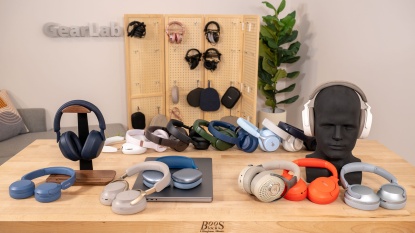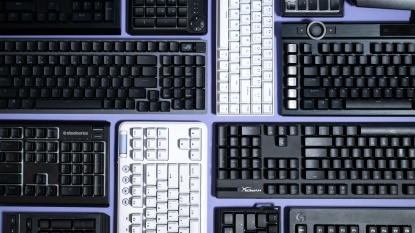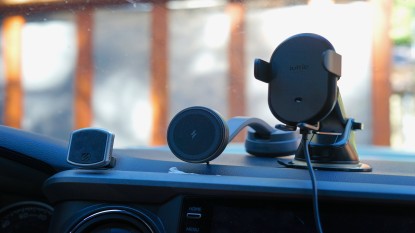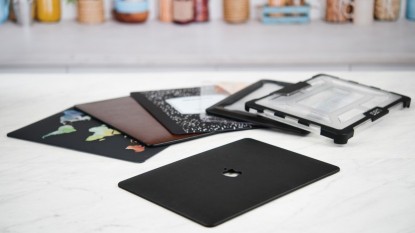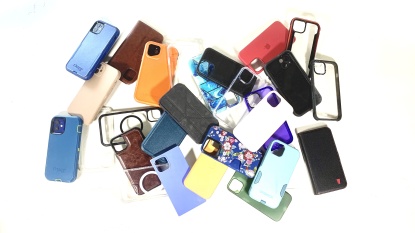Looking for the best smartphone gimbal on the market today? We researched dozens of top models before purchasing the top six most promising devices to set in a head-to-head smartphone gimbal showdown. We unboxed and compared traits in the lab before taking every model outside to nab some footage while riding an electric skateboard in an obstacle course and on a single-track dirt trail. In the end, it was clear to see which models were the best for certain applications, which were the best bargain, and which were the best overall.
Check out our review on iPhone gimbals as well as other smartphone accessories like iPhone cases (including our picks for the top iPhone 16 cases) and content-creating tools like top-rated ring lights and tripods for iPhones.
Quick Look
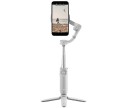
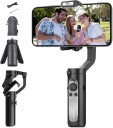
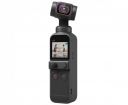
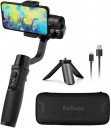
The Best Smartphone Gimbals
Full results from testing 6 top products are in our Product Comparison Table and Analysis & Test Results sections.
It's hard to top the overall performance of the DJI OM 5. We love the magnetic mounting system that essentially eliminates the trial and error method of balancing employed by many other models. The innovative telescoping arm helps you snap self-portraits with more friends or more background in the image and enables you to get low angles while shooting action videos. To further enhance the video capabilities, DJI has programmed the OM 5 with the same Active Track 4.0 software that is used on some of their professional-grade gimbals and drones. If you're looking for a smartphone gimbal that travels well while offering a plethora of capabilities, this is the one — the OM 5 is incredibly compact for this style of device.
We found very few flaws during our assessment, but some may influence your purchasing decision. There are some models that offer greater than 360° or even limitless panoramic panning range — the OM 5 is limited to 300°. The battery lasts 6 hours which may be plenty enough for your purposes, but other models last more than twice as long. The OM 5 lacks a USB port for charging your phone while you're shooting, so be sure that your phone battery has lots of juice before embarking on your influencer adventures. Another drawback is the price. There are models available that are capable of many of the same shots as the OM 5 that won't put nearly as big of a dent in your bank account. Drawbacks aside, if you want a compact folding smartphone gimbal with stellar performance alongside fully customizable settings, we think the OM 5 is the way to go.
Dimensions: 8.9" x 1.5" x 3.4" | Weight: 9 oz
If you're in the market for a smartphone gimbal but don't want to break the bank to purchase one, we recommend the Hohem iSteady X. One of our favorite features of the X is that you can switch between landscape and portrait modes by merely touching a button. Few other gimbals provide this feature which is a considerable step up from having to rebalance your phone. Though it's not quite pocket or purse size, it is relatively small and light for a device that offers so many capabilities, and it comes with a handy storage bag. Hohem boasts an improved anti-shake algorithm for the X that provides ultra-smooth footage even while driving over rugged terrain or following a friend down the ski slope.
The Hohem iSteady X has a limited mechanical range. While other handheld gimbals provide 360 degrees and even infinite panoramic panning, the X is limited to 320 degrees. We've found that the tripod included with this device is a bit flimsy, which may lead to some shakiness while shooting motion lapses and time lapses in windy conditions. Despite these minor drawbacks, this is still our recommended smartphone gimbal for those shopping on a budget.
Dimensions: 5" x 1.5" x 1" | Weight: 4 oz
DJI has come to be known as one of the leading brands in consumer and professional drones, cameras, and accessories around the world. The DJI Pocket 2 takes some of the best advancements in the technology they've developed over the years and packed it into a pocket-sized device. Our favorite feature of the Pocket 2 is that you can shoot with it standalone, or you can physically link it to your phone to use your phone as a larger screen or change settings. The quality of shots this model produces is ridiculous — it shoots 4K video and up to 64MP photos even when it is not attached to your phone. Some people may really enjoy the fact that it shoots to a memory card, allowing you to get footage straight from the device to your computer. Though some may prefer to edit using phone software, inserting the memory card directly into your computer allows you to make your edits using professional-grade editing programs.
We really couldn't find much to complain about while testing the DJI Pocket 2. However, our team agreed that while using it without your phone attached, the screen is really small compared to a smartphone. Also, be prepared to spend a substantially higher dollar amount for the Pocket 2 than other gimbals—but remember you're paying for a camera as well. Although there are many accessories available for this model, they are all sold separately. Drawbacks aside, if you want a standalone camera with all of the stabilization of a gimbal that also mounts to your phone, this is the one.
Dimensions: 11.75" x 4.9" x 1.5" | Weight: 1 lb 1 oz
The Hohem iSteady Mobile Plus is another one of our favorite smartphone gimbals. It is capable of panning horizontally 600 degrees while the second and third axis can pivot up to 320 degrees. Combining the range of all three axes allows the user to pan, tilt, and roll in any number of combinations that both photographers and videographers can genuinely appreciate. This model also offers a ton of customizable settings to personalize your shots to the max. One feature we really love is that you can adjust and customize the mechanical action in ways such as adjusting zoom speed, panning speed, and even reversing the joystick's action. The Hohem iSteady Mobile Plus comes with a great case that houses the cord, tripod, and gimbal so that you can rest assured that your investment will be protected from impacts and elements while traveling.
There are a few ways that the Hohem iSteady Mobile Plus falls behind some of the competitors. When switching between portrait and landscape mode, you are required to rebalance your phone — not ideal. It also doesn't include the best tripod. The feet are made of soft rubber, allowing the whole gimbal to sway a bit in the wind. This can completely ruin an otherwise great panorama or time-lapse, although an inexpensive solution is to purchase a stiffer aftermarket tripod. Despite these flaws, we think the Hohem iSteady Mobile Plus is a fantastic choice if you're in the market for a smartphone gimbal with phenomenal mechanical abilities that offers custom settings beyond what much of the competition has considered.
Product Comparison Table
Why Trust GearLab
To spearhead this review, we used a team composed of our In-House Senior Review Editor Ross Patton and In-House Senior Review Analyst Austin Palmer. During adolescence, Ross and his friends were constantly creating skateboard and snowboard edits and films using old technology dating back to the days of 3CCD digital video cameras and capturing footage with Firewires. To this day, he still spends time both in front and behind the camera in the snowboard industry and has worked on projects such as X Games Real Snow and independent films that were promoted by Snowboarder Magazine. His hands-on experience, coupled with his formal education from the University of Nevada, Reno, where he majored in Environmental Science, made him an obvious choice for this review team. Austin has been with the GearLab team for more than five years and has tested hundreds of tech-related categories ranging from 3D printers and the best vr headset to top-notch stylus pens. With these two on the job, you can rest assured that we've studied and tested these products inside and out to provide the best buying advice to our readers that we possibly can.
We began in the lab by analyzing the physical traits and setup time of each model. We judged the panning speeds, controls, and motion for them. We then measured their mechanical ranges to hold the manufacturers accountable for their claims. Finally, we took the devices outside to gather content in order to analyze footage.
Analysis and Test Results
For this review, we broke our data down into three subcategories, which are shown in the following paragraphs. We conducted side-by-side tests for stability, judged the ease of use, and considered anything that set each model apart from one another when it comes to functionality. We conducted each assessment with both an Apple iPhone and a Samsung Galaxy to note any differences in performance. Our testing team could not find any discernible discrepancies between iOS and Android apps for any smartphone gimbal manufacturer that we tested.
What's the Best Value?
If you're shopping on a budget, the Hohem iSteady X offers a lot of the standard capabilities of the competition, but at a fraction of the cost. At a slightly higher price point, the Hohem iSteady Mobile Plus is the only one of our award winners that is capable of rotating more than 340° on the panoramic axis. The DJI OM5 is on the pricey side, but with its telescoping arm and incredible tracking software, it's the ultimate folding-style smartphone gimbal for both tech nerds and action sports junkies. Finally, the DJI Pocket 2 is very expensive. However, this model is a standalone camera with an integrated gimbal that can also be attached to your phone.
Features & Capabilities
Before you decide which smartphone gimbal you're going to purchase, it's a good idea to determine the application for which you will use the device. Each gimbal has its different strengths and weaknesses. If you are primarily vlogging, you probably aren't going to need a model with much panoramic range, while someone shooting motion lapses would want as much range as possible. Somebody filming action sports may want a different gimbal than somebody shooting lifestyle shots. A certain model may have great video settings but lack on the photo side of things and vice versa.
It would be hard to beat the variety of features and settings the OM 5 has to offer. The magnetic clip that connects to the gimbal arms is an innovative feature that we immediately fell in love with. You can choose between the spring-loaded clip that grabs onto your phone or use the magnetic sticker that you can mount on your case or your phone itself.
One feature that the OM 5 offers that no other smartphone gimbals have to date is the telescoping arm. With the rod extended, you can capture selfies with a larger background or more people. Our team found that the long arm also helps to get even lower and closer to your subject while filming action clips.
In addition to the normal video and photo modes, the OM 5 can shoot in sport mode, Dyna-zoom, active track, burst shots, auto-stitched panoramas, motion time-lapses, and hyper lapses. A function that we were very impressed with is the auto-stitched photos. While positioned on the tripod, with the push of one button, the camera automatically takes a 3x3 grid of photos and blends them together, allowing you to get more of what you can see with the naked eye into your photo than your phone normally can.
The OM 5 has a panorama setting called “Clone Me.” While this mode is enabled, the gimbal shoots three individual photos at different positions and then automatically stitches them together. The gimbal emits an audible alert so you know exactly when to pose for each shot.
The OM 5 offers a few more features than the Hohem iSteady Mobile Plus, but the latter model offers 600 degrees of panoramic rotation, allowing for all kinds of ways to get creative.
The Hohem iSteady Mobile Plus and Hohem iSteady X each have their own versions of fast-tracking, Hitchcock mode, sport mode, and face tracking. Both of these models have a roll and tilt range of 320 degrees, which is great for shooting underneath or above your subject with minimal strain on your wrist.
The main thing that separates the Hohem iSteady X from the others is that it is using Hohem's new algorithm they've titled “iFlow,” which uses a new mechanical control system and an advanced stabilizing chip for ultimate stabilization.
The size of the DJI Pocket 2 may throw some people off, but don't be fooled — this device has an extensive list of capabilities. There's no need to link it to your phone at all, and it includes many of the features that we've come to expect from a high-end smartphone gimbal, including slow motion, hyper lapses, motion lapses, and time-lapses. It also shoots the same nine photo auto-stitch panoramas as the DJI OM 5. If you desire, you can physically attach it to your phone to use the larger screen for better viewing, video editing, or to change settings. This new version now shoots 64MP photos, and DJI has added a joystick to control the microsized gimbal arm.
Ease of Use
One very important element to consider while shopping for a smartphone gimbal is user-friendliness. Hardcore enthusiasts who don't mind adjusting the many intricate settings that go into fine-tuning a shot likely won't mind purchasing a model that takes a little bit longer to learn how to use. On the flip side, if you just want to get smoother shots or shoot more stable panoramas than you can get with your hands, you may want a simpler model.
If you want a gimbal that you can essentially take out of the box and start shooting with, it's hard to top the DJI Pocket 2. You don't need to unfold or balance your phone at all while using this model; just turn the device on and start shooting.
Linking the Pocket 2 to your phone is a breeze; simply use the included Lightning or USB Type C adapter to physically plug your smartphone into the gimbal. When it comes time to review or edit your footage, you can pop out the MicroSD card, plug it into your computer, and use your favorite editing program. You can also edit on your phone using the DJI Mimo app or the application of your choice.
The Hohem iSteady X is very easy to use. All you need to do is attach your phone to the spring-loaded clamp on the gimbal and balance it. Our testing team found this process to be very easy compared to most models, and it requires minimal fine-tuning.
The iSteady X, along with the DJI OM5, allows you to switch from portrait to landscape mode with the simple push of a button rather than having to disconnect and reattach your phone to switch it up.
The DJI OM 5 is fairly easy to physically operate. With the magnetic clip, you hardly have to worry about initially balancing your phone. You can either use the included template to permanently mount a magnetic sticker to your phone or use the spring-loaded clamp — both are included in the package. The OM 5 has an ergonomic handle that is very comfortable to hold, even for smaller hands. If you choose to extend the telescoping arm, this model takes an extra few seconds to get from travel mode to snapping shots.
The out-of-the-box setup process for the OM 5 requires you to simply download the app, connect your phone using Bluetooth, and use the on-screen tutorials to learn the various controls and settings.
The OM 5 lost points when it came time to figure out the nitty-gritty details of the software. It took us a while to learn the controls and settings. That said, once we mastered the intricacies of things like adjusting camera white balance and ISOs or nailing down the motion lapse paths, this smartphone gimbal became one of our favorites.
When it comes to user-friendliness, the Hohem iSteady Mobile Plus has its strengths and weaknesses. The balancing is a bit of a pain with this device. It takes some fine-tuning, and if you want to switch between landscape and portrait modes, you have to start the process over again. Similar to the DJI app, the Hohem app takes some time to learn. However, if you're the type of person that's into a lot of tricky effects and manual settings, the iSteady Mobile Plus is a solid choice.
Stability
Capturing smooth footage is one of the primary purposes of smartphone gimbals. For the first part of the stability section of our review, we walked around the lab with each model and analyzed the footage using our expert media team. We noted any strange movements or jerks while using each model. We then created an obstacle course using road cones and ran through the course with each model on an electric skateboard. Next, we used a top-notch electric skateboard to ride around on some dirt trails while both following and being chased by our resident hound dog Broadus. We analyzed all of the footage side-by-side and had the GearLab team vote on which models produced the best results. Lastly, we analyzed the sturdiness and rigidity of the tripods for people who are concerned with stability while shooting static video shots, lapses, and panoramas.
Using DJI's newest algorithms, the OM 5 is the undisputed king of smartphone gimbal stability. While chasing a test subject using an electric skateboard, there was a noticeable difference from the other models thanks to DJI's “Active Track 4.0” software.
We also found the all-new “iFlow” algorithm programmed into the Hohem iSteady X to produce exceptionally smooth and stable footage. However, it is fairly low to the ground while on the tripod. The tripod has a small footprint and isn't that stiff, which could potentially lead to some swaying or even tipping in strong winds.
The Hohem iSteady Mobile Plus is nearly as stable as the Hohem iSteady X, but we learned that it doesn't react as quickly in sport mode as the models mentioned above. It has a similar tripod to the iSteady X, but with the longer handle, your phone is much higher off the ground. The combination of the long handle with the small tripod can make for some shaky shots and may even act as a sail and blow your setup over.
The DJI Pocket 2 scored very well in our obstacle course assessment. This model likes to film straighter than the others, and with the all-new joystick, which improved upon the last model, you have full control over your angles. The Pocket 2 includes an attachment with a tripod socket that is easily swappable with the standard base, but you'll need to provide your own tripod. However, we found it was pretty easy to figure out a way to prop it up in most situations.
Conclusion
Smartphone gimbals are an affordable and relatively easy way to use a device you already own to make production-quality photos and videos. Whether you're a time-lapse fanatic, want to create movies of your travels or a friend's wedding, or want to film your son ripping it up at the snowboard park, these innovative devices will help you step your content creation game up. We had an absolutely great time testing these products, and we hope that you now have the knowledge to purchase the perfect model for your budget and needs.
—Ross Patton and Austin Palmer


